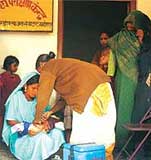It's very difficult for an Indian corporate to do a Warren Buffet
30 July, 2006 | The Financial Express
ShareThe Financial Express
Sulekha Nair
30 July 2006
Indian corporates may not be as generous as Warren Buffet, who donated close to $39 billion to charity. But corporates get together at various fora to do their bit for charity. Recently, some corporates got together at an event organised by Habitat For Humanity India and formed an indiaBUILDS Advisory Committee for building homes for the poor. The Aditya Birla Group was one of them. Rajashree Birla, chairperson of the Aditya Birla Centre for Community Initiatives and Rural Development, spoke on:
Habitat For Humanity (HFH) initiative: This initiative with HFH has its roots in our association with them many years ago. We had built houses for tsunami affected people in Tamil Nadu and rebuilt over 100 homes. This time we have pledged support for 500 homes.
 CSR: I feel CSR is something every corporate can do, and most of them do it too. However, it is unrealistic to expect corporates to lend support to all social schemes that benefit the poor. CSR is an aspect of a company’s policy. The government has so many schemes and has also allocated funds for them.
CSR: I feel CSR is something every corporate can do, and most of them do it too. However, it is unrealistic to expect corporates to lend support to all social schemes that benefit the poor. CSR is an aspect of a company’s policy. The government has so many schemes and has also allocated funds for them.
I also feel that if government ropes in corporates besides the NGOs, the schemes would be very effective. With corporates coming on the scene, there would be a discipline and a definite manner of working. It would also bring about a greater transparency.
Group’s CSR: We focus on five key areas — health, education, water and sustainable livelihood, infrastructure development, social causes such as anti-dowry and anti-alcohol initiatives and widow remarriage, etc. We have an articulated social vision, which is to actively contribute to the social and economic development of the communities in which we operate.
In doing so, we build a better, sustainable way of life for the weaker sections of society and raise the country’s human development index. We have adopted 3,700 villages in 40 places in the country. Through this, we reach out annually to more than five million people. Of these 60 per cent live below the poverty line. To actualise our vision, we work at the grassroots level. All our projects are planned in a participatory manner, very much in consultation with the communities. We have never opted for projects just for the ‘feel good’ factor, or for that matter cheque book philanthropy.
 Our aim is always to work out projects that are over long-term and are sustainable for the beneficiaries. This has two benefits. Firstly, it not only facilitates self-reliance among the people, but also does away with the culture of dependency.
Our aim is always to work out projects that are over long-term and are sustainable for the beneficiaries. This has two benefits. Firstly, it not only facilitates self-reliance among the people, but also does away with the culture of dependency.
Secondly, it enables us to move on from those villages and replicate the projects in other areas. We have a one-year plan and three-year rolling plan which are comparable to our business plans. Our programmes are measurable, sustainable and replicable. We work very closely with our partners — the communities, the district authorities, panchayats and s;electively with NGOs.
Favourite CSR programme: Rural developmental work, undertaken by the Birla Group, is my favourite programme. There is a lot of work to be done in villages. There are issues of housing, education, hygiene and technical education. All these are imparted here. Under the Aditya Vikram Birla Vikas Sahyog Kendra, we give small loans to the needy at a nominal rates of interest. This has been very successful in helping rebuild villages.
Warren Buffet’s charity: In the Indian context, we don’t have the mindset to give away large amounts of money to charity. Corporates here do a lot for charities and are linked with many NGOs. This trend of giving away large amounts to charity is happening only in the US. I think it calls for very large heartedness. The donors leave just a little bit for their children so as to be able to live comfortably and at the same time not dependent on the wealth they have earned. I don’t see this happening in the Indian context in the near future at least.






